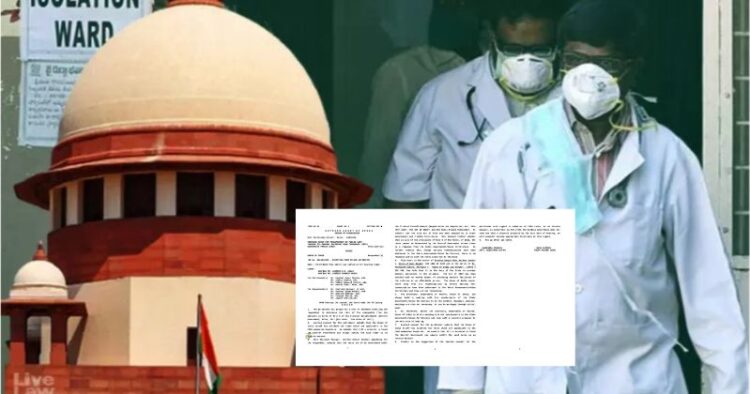The Supreme Court has issued a directive to the Union Government to convene a meeting with state health secretaries to address the issue of inconsistent rates for medical treatments and procedures across hospitals in various regions. The court emphasised the urgency of establishing standardised rates to ensure equitable access to healthcare for all citizens.
During the hearing of a Public Interest Litigation (PIL) filed by the NGO ‘Veterans Forum for Transparency in Public Life,’ the bench comprising Justices BR Gavai and Sandeep Mehta expressed dissatisfaction with the Centre’s lack of decisive action on the matter. The PIL urges the Centre to determine fee structures for medical services based on Rule 9 of the Clinical Establishment Rules 2012.
Under Rule 9, hospitals and clinical establishments are mandated to prominently display rates for services and facilities in both local and English languages. These rates must fall within the range determined by the Centre in consultation with state governments.
The court underscored the need for a standardised fee structure, citing examples such as cataract surgery, which can cost significantly more in private facilities compared to government hospitals. It stated that in a government hospital, the cataract surgery normally costs around Rs10,000 while in a private hospital, it costs somewhere between Rs 30,000 to Rs 1,40,000 The bench highlighted the fundamental right to healthcare and emphasised the Centre’s responsibility in ensuring accessibility and affordability of medical services.
In response to the court’s directive, the Union Government informed the court that it had corresponded with states on multiple occasions regarding the issue but had not received a favourable response. The court, however, reiterated that the government cannot evade its responsibility towards citizens’ healthcare needs.
The PIL draws attention to the constitutional mandate to provide for public health and welfare, as outlined in the preamble and Directive Principles of State Policy. Articles 38, 42, 43, and 47 of the Constitution impose a constitutional obligation on the state to prioritise healthcare and ensure the well-being of individuals.
Court asks Union Govt to fix rates if State Govts fail to do so
Taking cognisance of the matter, the Supreme Court has told the Union government that if the State Governments have failed to take any concrete action with regards to fixing the rates, then in such a case, the Union Government can take things under their control and formulate the rules for the time being.
The court observed, “ Learned counsel for the petitioner submits that the Union of India itself has notified the rates which are applicable to the CGHS-empanelled hospitals. He submits that till a solution is found, the Central Government can always notify the said rates as an interim measure.”
Recognising healthcare as a fundamental right, the Supreme Court stressed the importance of establishing transparent and uniform rates for medical services. The court’s intervention aims to address the existing disparities in healthcare costs, particularly between government and private healthcare facilities.
The directive to convene a meeting with state health secretaries underscores the collaborative effort required to establish a comprehensive and equitable healthcare system. By engaging stakeholders at the state level, the Centre aims to facilitate meaningful dialogue and consensus-building towards the implementation of standardised hospital charges.
GIC Calls For ‘Cashless Everywhere’ Initiative Amidst Healthcare Rate Standardisation Debate
The General Insurance Council (GI-Council) has unveiled the ‘Cashless Everywhere’ initiative aimed at streamlining the claims process and ensuring customer convenience. Tapan Singhel, Chairman of the GI-Council, emphasized the industry’s commitment to offering high-quality products at reasonable rates while minimizing friction for customers, particularly during claims.
Singhel stated, “We need to charge an appropriate cost for customers, whether it’s at policy issuance or during claim settlements.” He expressed optimism about the Supreme Court’s push for standard hospital rates, believing it will complement the ‘Cashless Everywhere’ initiative, ultimately benefiting citizens’ right to quality healthcare.
The initiative follows extensive discussions and deliberations with stakeholders, including hospital associations and providers. Two provider meetings were held, where hospital representatives participated, leading to the announcement of ‘Cashless Everywhere’ by the Council.
However, some hospitals have expressed reservations about the initiative. Nonetheless, proponents argue that supporting ‘Cashless Everywhere’ could lead to increased patient volume, benefiting hospitals in the long run.
One key concern highlighted is the absence of a hospital regulator to advocate for patient interests and ensure standardization in treatment quality, service, and the provision of cashless facilities. The Department of Financial Services (DFS) has urged collaboration between the National Health Authority (NHA), insurers, and DFS to explore the possibility of establishing a health regulator.
The proposed regulator would address affordability concerns and enhance patient experience by enforcing quality standards and facilitating seamless access to cashless facilities.
The ‘Cashless Everywhere’ initiative, alongside the potential establishment of a health regulator, reflects the industry’s commitment to enhancing healthcare accessibility and quality for customers. It aligns with the broader goal of ensuring that citizens have access to affordable and reliable healthcare services.
As discussions continue and initiatives are rolled out, stakeholders remain hopeful that collaborative efforts will pave the way for a more efficient and customer-centric healthcare ecosystem.
The Supreme Court has scheduled the next hearing on April 6 to monitor progress on this matter. The court’s proactive stance reflects its commitment to upholding citizens’ rights to healthcare and ensuring that the government fulfills its constitutional obligations in this regard.



















Comments